Pharsalus (48 BCE)
Q203681In the Battle of Pharsalus, on 9 August 48 BCE, the Roman general Julius Caesar defeated the troops of the Roman Senate, commanded by his rival Pompey the Great. Caesar's victory marked the end of the Roman republic.
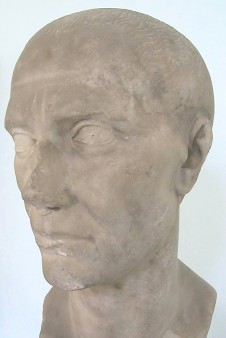
On this webpage, you can find a translation of Caesar's own account of the decisive battle; chapters 3.88-99 of the Civil War were translated by W. A. McDevitte and W. S. Bohn. (For another account, go here.)
Introduction
The civil war between Julius Caesar and the Senate had broken out early in 49, when the conqueror of Gaul, who was not permitted by the Senate to run for consul, crossed the river Rubico. His rival Pompey the Great decided to fight for the Senate, but he was soon forced to retreat from Italy to the east. Caesar gained some successes in Spain, where he defeated the troops that were loyal to Pompey, returned to Italy, and in January 48 crossed the Adriatic Sea, where he landed in modern Albania with seven legions. However, his navy was defeated and the remaining four legions could not be ferried to the east.
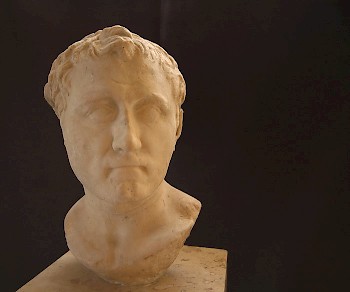
For a half year, Pompey and Caesar remained at Dyrrhachium (modern Dürres), where they built large fortresses facing each other. In March, Caesar's deputy Mark Antony managed to reinforce him with the other four legions.
The united army, however, was defeated (July 7), and Caesar had only one option: to march inland, cross the Pindus mountains and defeat Pompey's pursuing army somewhere in Greece on a more suitable place. This eventually happened to be at Pharsalus, where Caesar's more experienced men overcame Pompey's larger army (9 August). Almost 6,000 Roman soldiers were killed, and when Caesar surveyed the battlefield at sunset and saw the bodies of the dead senators, he remarked: "Well, they would have it thus." This was the end of the Roman republic and the beginning of Caesar's autocracy.
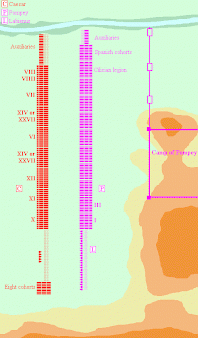
Some believe that the battle took place to the northwest of Pharsalus, with Caesar's troops attacking from the east and Pompey's men fleeing to the west; others believe that it was the other way round - the battle taking place northeast of Pharsalus, Caesar attacking from the west, Pompey's soldiers fleeing to the east. The present author visited both sides and believes the second possibility is more likely. The map is, therefore, based on the second theory, but if you prefer the first one, just turn it upside down.
Caesar on the Battle of Pharsalus
[3.88] When Caesar approached Pompey's camp, he observed that his army was drawn up in the following manner: On the left wing were the two legions, delivered over by Caesar at the beginning of the disputes in compliance with the Senate's decree, one of which was called the First, the other the Third.note Here Pompey commanded in person.
[Pompey's father-in-law Quintus Caecilius Metellus Pius] Scipio with the Syrian legions commanded the center. The Cilician legion in conjunction with the Spanish cohorts [...] were disposed on the right wing. These Pompey considered his steadiest troops. The rest he had interspersed between the center and the wing, and he had 110 complete cohorts; these amounted to 45,000 men. He had besides two cohorts of volunteers, who had received favors from him in former wars, and now flocked to his standard: these were dispersed through his whole army. The seven remaining cohorts he had disposed to protect his camp and the neighboring forts. His right wing was secured by a river with steep banks; for this reason he placed all his cavalry [commanded by Titus Labienus], archers, and slingers, on his left wing.
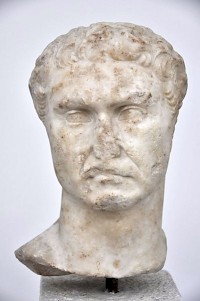
[3.89] Caesar, as always, had placed the tenth legion on the right, the ninth on the left, although it was very much weakened by the battles at Dyrrhachium. He placed the eighth legion so close to the ninth as to almost make one of the two, and ordered them to support one another. He drew up on the field eighty cohorts, making a total of 22,000 men, and left two cohorts to guard the camp. He gave the command of the left wing to Mark Antony, of the right to [Publius Cornelius] Sulla, and of the center to Gnaeus Domitius [Calvinus]. Caesar himself took his post opposite Pompey. At the same time, fearing, from the disposition of the enemy which we have previously mentioned, lest his right wing might be surrounded by their numerous cavalry, he rapidly drafted a single cohort from each of the legions composing the third line, formed of them a fourth line, and opposed them to Pompey's cavalry, and, acquainting them with his wishes, admonished them that the success of that day depended on their courage. At the same time he ordered the third line, and the entire army not to charge without his command: that he would give the signal whenever he wished them to do so.
[3.90] When he was exhorting his army to battle, according to the military custom, and spoke to them of the favors that they had constantly received from him, he took especial care to remind them "that he could call his soldiers to witness the earnestness with which he had sought peace [...], that he had been always reluctant to shed the blood of his soldiers, and did not wish to deprive the republic of one or other of her armies." After delivering this speech, he gave by a trumpet the signal to his soldiers, who were eagerly demanding it, and were very impatient for the onset.
[3.91] There was in Caesar's army, a volunteer named Crastinus, who the year before had been first centurion of the tenth legion, a man of pre-eminent bravery. When the signal was given, he said, "Follow me, my old comrades, and display such exertions on behalf of your general as you have determined to do. This is our last battle, and when it shall be won, he will recover his dignity, and we our liberty."
At the same time he looked back to Caesar, and said, "General, I will act in such a manner today that you will feel grateful to me, living or dead."
After uttering these words he charged on the right wing, and about 120 chosen volunteers of the same century followed.
[3.92] There was so much space left between the two lines as sufficed for the onset of the hostile armies, but Pompey had ordered his soldiers to await Caesar's attack and not to advance from their position, or suffer their line to be put into disorder. He is said to have done this by the advice of Gaius Triarius, that the impetuosity of the charge of Caesar's soldiers might be checked, and their line broken, and that Pompey's troops remaining in their ranks, might attack them while in disorder; and he thought that the javelins would fall with less force if the soldiers were kept in their ground, than if they met them in their course. At the same time he trusted that Caesar's soldiers, after running over double the usual ground, would become weary and exhausted by the fatigue.
But to me Pompey seems to have acted without sufficient reason: for there is a certain impetuosity of spirit and an alacrity implanted by nature in the hearts of all men, which is inflamed by a desire to meet the foe. A general should endeavor not to repress this, but he must increase it. Nor was it a vain institution of our ancestors that the trumpets should sound on all sides and a general shout be raised, by which they imagined that the enemy would be struck with terror and their own army inspired with courage.
[3.93] Our men, when the signal was given, rushed forward with their javelins ready to be launched, but perceiving that Pompey's men did not run to meet their charge, and having acquired experience by custom and practice in former battles, they of their own accord repressed their speed, and halted almost midway, so that they would not come up with the enemy when their strength was exhausted. After a short respite they renewed their course, threw their javelins, and instantly drew their swords, as Caesar had ordered them.
Nor did Pompey's men fail in this crisis, for they received our javelins, stood our charge, and maintained their ranks; and having launched their javelins, had recourse to their swords. At the same time Pompey's cavalry, according to their orders, rushed out at once from his left wing, and his whole host of archers poured after them. Our cavalry did not withstand their charge, but gave ground a little, upon which Pompey's horse pressed them more vigorously, and began to file off in troops, and flank our army.
When Caesar perceived this, he gave the signal to his fourth line, which he had formed of the six cohorts.note They instantly rushed forward and charged Pompey's horse with such fury, that not a man of them stood; but all wheeling about, not only quitted their post, but galloped forward to seek a refuge in the highest mountains. By their retreat the archers and slingers, being left destitute and defenseless, were all cut to pieces. The cohorts, pursuing their success, wheeled about upon Pompey's left wing, while his infantry still continued to make battle, and attacked them in the rear.
[3.94] At the same time Caesar ordered his third line to advance, which till then had not been engaged, but had kept their post. Thus, new and fresh troops having come to the assistance of the fatigued, and others having made an attack on their rear, Pompey's men were not able to maintain their ground, but all fled. Caesar had not been wrong when he had declared in his speech to his soldiers that victory would have its beginning from the six cohorts that he had placed as a fourth line to oppose the horse. For by them the cavalry were routed; by them the archers and slingers were cut to pieces; by them the left wing of Pompey's army was surrounded, and obliged to be the first to flee.
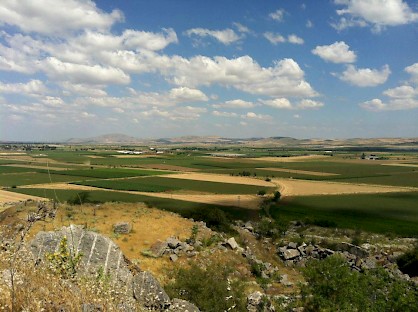
When Pompey saw his cavalry routed [...], he despaired [...], quitted the field, and retreated straightway on horseback to his camp. Calling to the centurions, whom he had placed to guard the main gate, with a loud voice, that the soldiers might hear: "Secure the camp," says he, "defend it with diligence, if any danger should threaten it; I will visit the other gates and encourage the guards of the camp." Having thus said, he retired into his tent in utter despair, yet anxiously waiting the issue.
[3.95] Caesar, having forced the Pompeians to flee into their entrenchment and thinking that he ought not to allow them any respite to recover from their fright, exhorted his soldiers to take advantage of fortune's kindness, and to attack the camp. Though they were fatigued by the intense heat, for the battle had continued till midday, they were prepared to undergo any labor and cheerfully obeyed his command.
The camp was bravely defended by the cohorts which had been left to guard it, but with much more spirit by the Thracians and foreign auxiliaries. For the soldiers who had fled for refuge to it from the field of battle, affrighted and exhausted by fatigue, having thrown away their arms and military standards, had their thoughts more engaged on their further escape than on the defense of the camp. Nor could the troops who were posted on the battlements long withstand the immense number of our darts. Fainting under their wounds, they quitted the place, and under the conduct of their centurions and tribunes, fled, without stopping, to the high mountains which joined the camp.
[3.96] In Pompey's camp you might see arbors in which tables were laid, a large quantity of plate set out, the floors of the tents covered with fresh sods, the tents of Lucius Lentulus and others shaded with ivy, and many other things which were proofs of excessive luxury and a confidence of victory, so that it might readily be inferred that they had no apprehensions of the issue of the day, as they indulged themselves in unnecessary pleasures, and yet upbraided with luxury Caesar's army, distressed and suffering troops, who had always been in want of common necessaries.
Pompey, as soon as our men had forced the trenches, mounted his horse, stripped off his general's habit, went hastily out of the back gate of the camp, and galloped with all speed to Larisa. Nor did he stop there, but with the same dispatch, collecting a few of his flying troops, and halting neither day nor night, he arrived at the seaside, attended by only thirty horse, and went on board a victualing barque, often complaining, as we have been told, that he had been so deceived in his expectation, that he was almost persuaded that he had been betrayed by those from whom he had expected victory, as they began the fight.
[3.97] When Caesar was master of Pompey's camp, he urged his soldiers not to be too intent on plunder and lose the opportunity of completing their conquest. Having obtained their consent, he began to draw lines round the mountain. The Pompeians distrusting the position, as there was no water on the mountain, abandoned it, and all began to retreat toward Larisa. Caesar perceived it, divided his troops, ordered part of his legions to remain in Pompey's camp, sent back a part to his own camp, and taking four legions with him, went by a shorter road to intercept the enemy, Having marched 9 kilometers, Caesar drew up his army.
But the Pompeians observing this, took post on a mountain, whose foot was washed by a river. Caesar encouraged his troops, though they were greatly exhausted [...], to throw up works and cut off the communication between the river and the mountain, so that the enemy might not get water in the night. As soon as our work was finished, they sent ambassadors to treat about a capitulation. A few senators who had espoused that party, made their escape by night.
[3.98] At dawn, Caesar ordered all those who had taken post on the mountain to come down from the higher grounds into the plain, and pile their arms. They did this without refusal, and with outstretched arms they prostrated themselves on the ground and with tears implored his mercy. He comforted them and bade them rise, and having spoken a few words of his own clemency to alleviate their fears, he pardoned them all, and gave orders to his soldiers, that no injury should be done to them, and nothing taken from them. Having used this diligence, he ordered the legions in his camp to come and meet him, and those which were with him to take their turn of rest, and go back to the camp. The same day, they went to Larisa
[3.99] In that battle, no more than 200 privates were missing, but Caesar lost about 30 centurions, valiant officers. Crastinus, also, of whom mention was made before, fighting most courageously, lost his life by the wound of a sword in the mouth. It had not been false what he had declared when marching to battle: for Caesar entertained the highest opinion of his behavior in that battle, and thought him highly deserving of his approbation.
Of Pompey's army, there fell about 15,000; but upwards of 24,000 were made prisoners: for even the cohorts which were stationed in the forts, surrendered to Sulla. Several others took shelter in the neighboring states. 180 stands of colors, and nine eagles, were brought to Caesar. Lucius Domitius [Ahenobarbus], fleeing from the camp to the mountains, his strength being exhausted by fatigue, was killed by the horse.